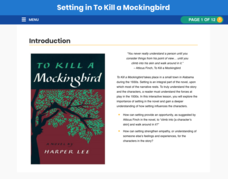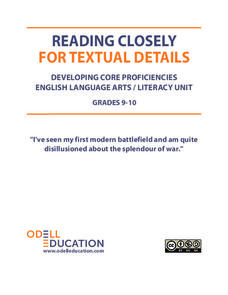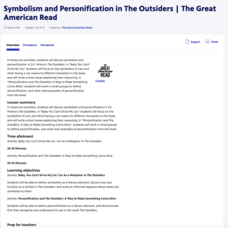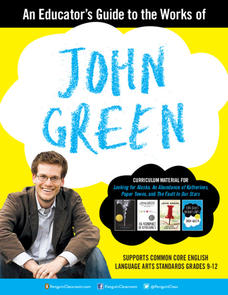Facing History and Ourselves
Defining Democracy
For democracies, it is both the best and the worst of times. As part of a study of the challenges facing democracies, young political scientists seek first to define democracy, and then to consider the relationship between democracy and...
Great Books Foundation
I Shall Not Beg for My Rights
An excerpt from Henry MacNeal Turner's address to the Georgia legislature provides class members with an opportunity to develop their literary analysis skills. Prompted by the provided factual, evaluative, and interpretive questions,...
Literacy Design Collaborative
Existentialism and Kafka
Scholars read Kafka's The Metamorphosis and research for essays and articles on existentialism. After gaining information and evidence from their research, pupils write essays defining existentialism and its relationship on the work of...
PBS
Their Eyes Were Watching God: Socratic Seminar
A Socratic seminar wraps-up a study of Zora Neale Hurston' Their Eyes were Watching God. Using the text and their notes, scholars focus on how characters in the novel accept or reject the societal norms of the times.
PBS
Their Eyes Were Watching God: The Impact of Language
Author, filmmaker, and anthropologist Zora Neale Hurston was also a dialectologist. The dialogue of the characters in her novel Their Eyes Were Watching God reveals her fascination with accents and dialects. A short video from the Great...
PBS
Setting in To Kill a Mockingbird
Can you understand more about how a person acts by learning about how that person lives? An interactive resource explores the setting of Harper Lee's To Kill a Mockingbird with several slides discussing the location, social conditions,...
Literacy Design Collaborative
Whom Do We Trust, and Why?
Is it possible to regain trust? Scholars put much thought into the subject of trust after reading Shakespeare's Macbeth. Readers work together to analyze how the character relationships develop the a message about trust. They then create...
PBS
A Time and Place: The Importance of Setting in To Kill a Mockingbird
A strong community acts as a family during difficult times. The evidence for the family aspects of Maycomb is abundant in Harper Lee's To Kill a Mockingbird, and it is the focus of a activity on the importance of setting as it relates to...
PBS
The Legacy of To Kill a Mockingbird: Continuing Atticus’s Fight for Justice
Tom Robinson was only one man in Harper Lee's To Kill a Mockingbird, but he represents many people throughout history who have not found justice in the American justice system. Language arts students discuss the theme of social justice...
EngageNY
Grade 10 ELA Module 4: Unit 2, Lesson 13
Lady Macduff uses a metaphor to suggest that her husband does not possess the courage of even a tiny, short-winged bird—ouch! Using the resource, pupils discover Act 4.2 of Shakespeare's Macbeth. Using reading, writing, and discussion,...
Odell Education
Reading Closely for Textual Details: Grades 9-10
Pay close attention! After finding details in a picture, scholars begin to find details in videos and text. They work together in groups, discuss in pairs, and carry out independent reading to answer guiding questions. Organizers, tools,...
PBS
Symbolism and Personification in The Outsiders
A shirt can't really swallow you—right? Readers find examples of symbolism and personification in S.E. Hinton's The Outsiders with two straightforward lessons.
EngageNY
Grade 10 ELA Module 4: Unit 2, Lesson 9
How does Shakespeare develop the central idea of agency versus fate in Macbeth? Using the resource, pupils work in small groups to discuss the plot of Act 3.1. Next, they complete a brief writing assignment to analyze how the main idea...
EngageNY
Grade 10 ELA Module 4: Unit 2, Lesson 7
One sentence, so much meaning. Scholars analyze a quote from Act 2.3 of Shakespeare's Macbeth and explore the plot in a jigsaw discussion.
EngageNY
Grade 10 ELA Module 4: Unit 2, Lesson 2
What is the best way to determine the theme of a text? Pupils analyze how central ideas emerge in Shakespeare's tragedy Macbeth. They work in small groups and engage in a whole-class discussion to discuss the play's plot. Finally,...
Simon & Schuster
Les Miserables Classroom Activities
Modern readers apply classic themes to Victor Hugo's masterpiece, Les Miserables. After they discuss tricky vocabulary and plot elements from the novel, class members compare Hugo's written work to a stage or film adaptation of the musical.
Great Books Foundation
Shared Inquiry Lesson Plan for “The New Colossus”
Two is better than one. Scholars use shared inquiry and discuss their ideas with one another to better interpret Emma Lazerus' poem "The New Colossus." They work through pre-reading, reading, questioning, and rereading activities before...
Literacy Design Collaborative
Macbeth: Influence of Supernatural
Something wickedly wonderful this way comes in a lesson that focuses on Macbeth. After a close reading of the play, class members craft a literary analysis essay in which they use evidence from the text to show how Shakespeare uses the...
EngageNY
Grade 10 ELA Module 2: Unit 1, Lesson 19
Great minds think alike. Scholars read two texts and compare how the authors develop the same central idea. Readers analyze "Women" by Alice Walker and "Letter from Birmingham Jail" by Martin Luther King Jr. They discuss word use and new...
EngageNY
Grade 10 ELA Module 2: Unit 1, Lesson 6
Readers determine if this statement applies when comparing the central idea of Ahmad Shamlu's "A Blind Alley" and Martin Luther King Jr's "Letter From Birmingham Jail." Learners analyze the standard related to the central message, listen...
University of Iowa
Every Atom: Walt Whitman’s “Song of Myself”
Discussion questions for Walt Whitman's "Son of Myself" ask class members to reflect on the beauty that can be found in labor, the sense of identity that transcends divisions, and on the many riddles in Whitman's poem. ...
Houghton Mifflin Harcourt
Walt Whitman: From Song of Myself
Looking for a resource that models how to read and analyze a poem? Check out this packet that uses sections of Walt Whitman's "Song of Myself" to demonstrate how to paraphrase, note literary elements, and identify the poet's inferences.
ELI Publishing
Whitman and the American ‘Romantic’ Nature
Pupils read a short biography of Walt Whitman and a portion of Whitman's epic poem "Song of Myself." Readers then respond to a series of comprehension questions.
Penguin Books
An Educator’s Guide to the Works of John Green
The novels of John Green cover the gamut of teenager emotions. A guide to his works provides classroom lesson plans for the novels Looking for Alaska, An Abundance of Katherines, The Fault in Our Stars, and Paper Towns. Each lesson...

























